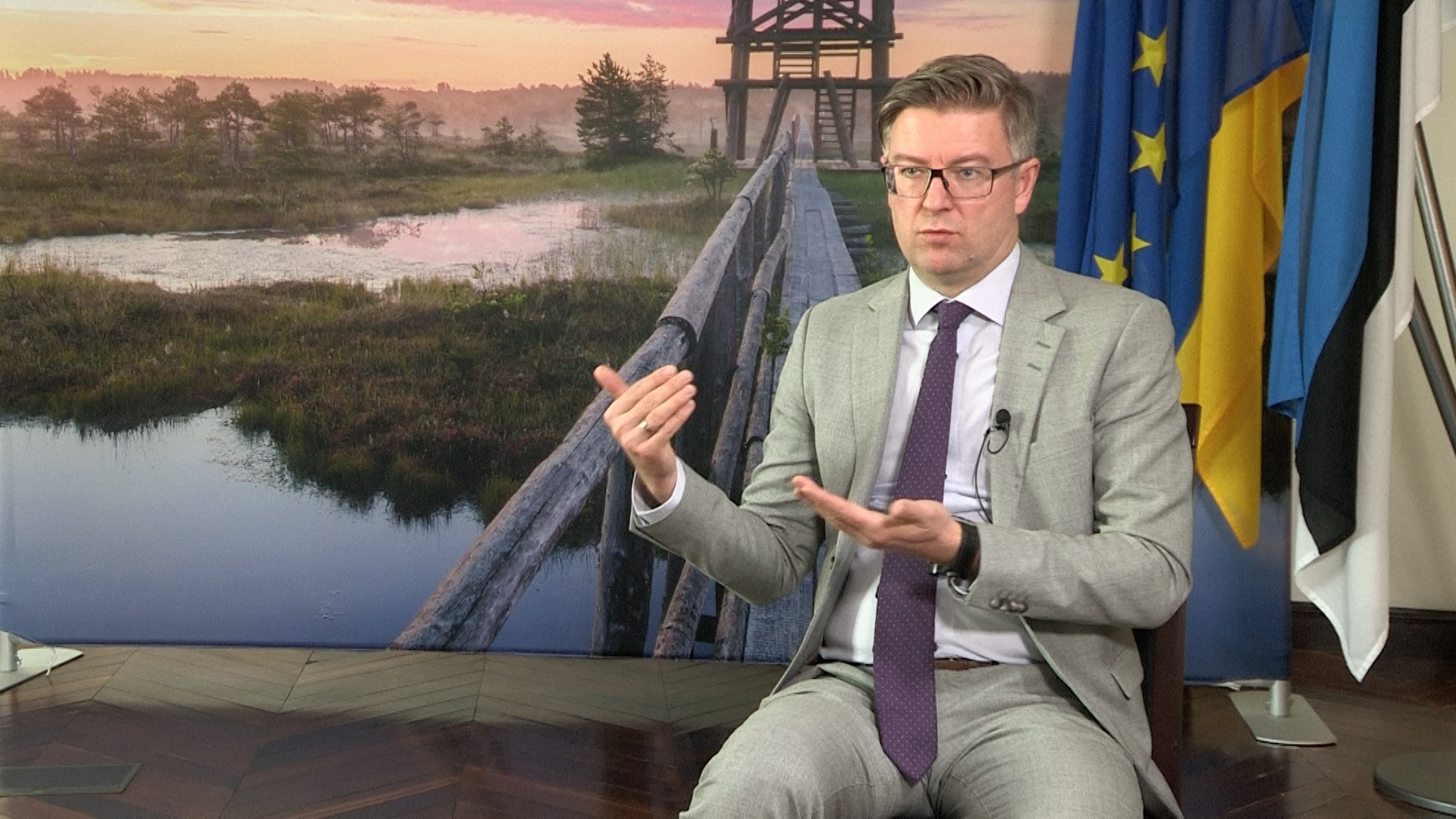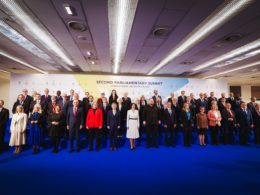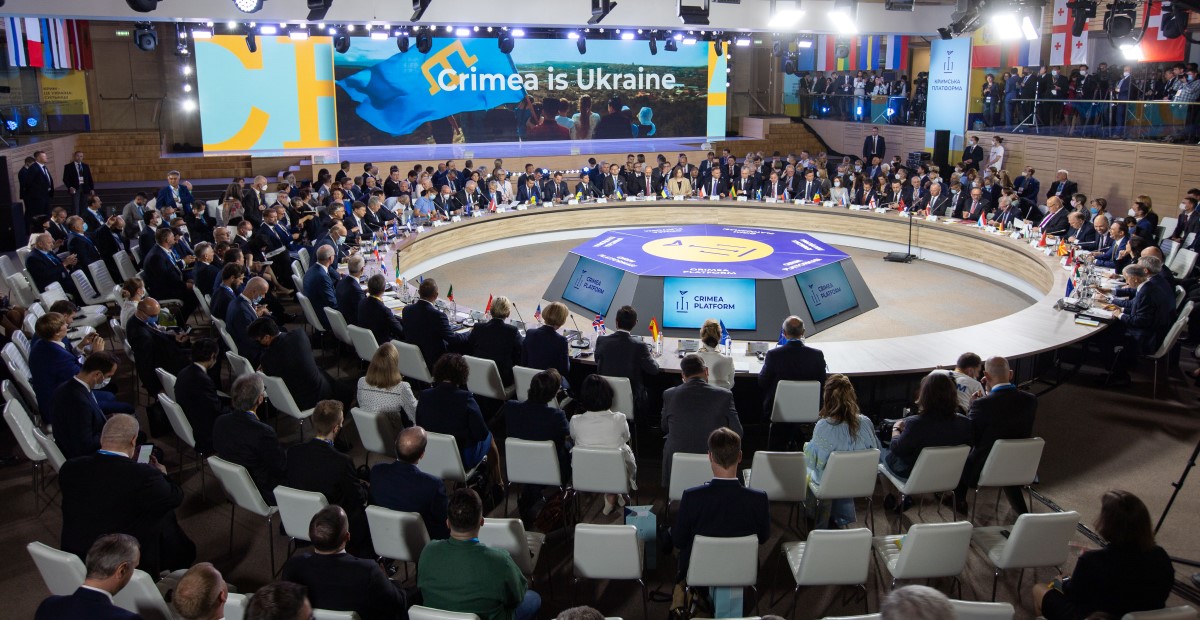How did the summit go? Is the Joint Declaration binding on the parties? And does the Crimea Platform have any chance of success?
First things first: what is the Crimea Platform?
Russia occupied and illegally annexed Ukraine’s Crimea seven years ago. That year, the United Nations General Assembly adopted a resolution by 100 votes not to recognise the peninsula’s annexation. Since then, the world has consistently condemned Russian president Vladimir Putin’s atrocities in Crimea. But time has passed and the problem has dropped out of sight in the global information landscape.
While two international platforms for Russian-occupied Donbas (Trilateral Contact Group on Ukraine and the Normandy Format) have been set up, no such mechanism has been elaborated for Crimea until now.
This new international consultative and coordination format was developed by Ukraine’s Ministry of Foreign Affairs to implement President Zelenskyy’s initiative. Kyiv’s foreign friends greeted this move:
“Finally we see proactive things from your side. Finally, you are not expecting something from us, but have initiated a new format,” Emine Dzhaparova, First Deputy Minister of Foreign Affairs of Ukraine, said this was Ukraine’s partners’ reaction to the Platform.
The Crimea Platform will operate regularly until the peninsula is returned to Ukraine. To this end, the Crimea Platform’s permanent office opened in Kyiv on 23 August. Its missions are expected to operate in other countries, too. The Platform will function as a complex of measures on different levels under the umbrella of the Joint Declaration made at the Summit. It may even be a high-level segment within the United Nations, commented Emine Dzhaparova.
Key takeaways from the inaugural Crimea Platform Summit
The inaugural summit on 23 August gathered a record number of foreign delegations in Ukraine, led by presidents, prime ministers, heads of parliaments, foreign ministers and leaders of international organizations.
The participants included all EU, NATO, and G7 states.
Some 14 delegations were represented by heads of states and governments, among them Poland, Hungary, Romania, Sweden, Finland, the Baltic states, Moldova, and Georgia. Charles Michel, President of the European Council, attended on behalf of the EU, and Marija Pejčinović Burić represented the Council of Europe. NATO and GUAM Under-Secretaries-General also joined the format.
The summit focused on four key directions:
- non-recognizing Russia’s attempt to annex Crimea;
- militarization of the Azov-Black Sea region;
- reintegrating Crimea through human rights and sustainable development;
- restoring the rights of the Crimean Tatar people.
The Crimea Platform Summit opened with a performance of “1944” by Jamala, a Ukrainian singer of Crimean Tatar ethnicity.

Having brought her triumph to the 2016 Eurovision Song Contest in Stockholm, this song tells the story of Stalin’s mass deportation of the Crimean Tatar population from the peninsula in 1944.
Ten things about the Crimean Tatar deportation you always wanted to know, but were afraid to ask
The performance was followed by President Zelenskyy’s speech. In his opening remarks, he mentioned that Crimea has remained under Russian occupation for 2,741 days. “We cannot lose another day,” he said. The President further added that the peninsula had been transformed from a world resort into a military base, a place of the grave with systemic human rights abuses. The damage done to Ukraine's economy for the seven years of Putin’s aggression has exceeded USD 100 billion, Prime Minister Denys Shmyhal said.

Speaking on behalf of the EU, Charles Michel emphasized that “Our aim is to make sure that the illegal annexation will in no way be legitimized.” He reaffirmed the EU’s non-recognition policy towards the illegal annexation of Crimea and urged Moscow to refrain from a deeper integration of the peninsula into the state.
Mircea Geoană, NATO Deputy Secretary-General, singled out that the situation in Crimea, eastern Ukraine, the Black and Azov Seas had effects on other nations. He also mentioned the June Summit of the Alliance in which NATO leaders reasserted the decision of the 2008 Bucharest Summit that Ukraine and Georgia will become members of NATO.
Foreign leaders unanimously denounced Putin’s annexation of Crimea, violations of human rights, and repression against ethnic Crimean Tatars by the occupation authorities. They underscored that #CrimeaIsUkraine and the state holds the right to restore its sovereignty and territorial integrity.
https://twitter.com/crimeaplatform/status/1429790538849468419
https://twitter.com/crimeaplatform/status/1429794316499755011
https://twitter.com/crimeaplatform/status/1429818433064026115
https://twitter.com/crimeaplatform/status/1429802039761121281
What did the participants of the Summit agree upon?
In the follow-up to the summit, the parties drew up a Joint Declaration of the Crimea Platform highlighting the main parameters of international policy towards Crimea.
“The Declaration firmly enshrines non-recognition of the illegal annexation of Crimea by the Russian Federation, obligation to consider additional restrictive sanctions against Russia in the case of further aggression, consolidation of efforts of all states participant for enhancing stability in the Black Sea region,” said President Zelenskyy at the end of the inaugural Summit.
In the Joint Declaration, the states reaffirmed their commitment to Ukraine’s sovereignty, political independence, unity and territorial integrity. They underscored the illegal character of Russia’s occupation and recognised it as “a direct challenge to international security with grave implications for the international legal order that protects the territorial integrity, unity and sovereignty of all states.”
Furthermore, the Crimea Platform participants condemned systematic abuses of human rights faced by the Crimean population, especially the Crimean Tatars who have put up primary resistance to occupation. These rights include in particular the right to peaceful assembly, freedom of expression and opinion, religion or belief, association and information.
Parties to the Declaration agreed to use the UN, the Council of Europe, the OSCE, and other international platforms to coordinate their efforts on Crimea.

As Ukraine’s Foreign Minister Kuleba said, the drafting of the Declaration was a bumpy road. The biggest stumbling block for many became the clause on anti-Russian sanctions. Finally, the participants decided “to consider further political, diplomatic and restrictive measures towards the Russian Federation… when appropriate and should Russia’s actions so require.”
The Joint Declaration remains open for signature after the event.
“I promise that the Summit’s Declaration condemning the occupation of Crimea will always have a line for the signature of the Russian Federation’s representative. Most likely, this signature will be at the last summit of the Crimea Platform in Yalta,” noted President Zelenskyy.
Despite scepticism, will the Crimea Platform work?
Can the Crimea Platform really help recover the peninsula? While Ukrainian and foreign experts engage in a heated debate on this question, we are witnessing the initiative’s first fruit: Crimea has come out of the shadows.
The Summit of 23 August caused a commotion among foreign media outlets.
The #CrimeaPlatform inaugural summit with 46 foreign delegations caused a significant resonance in the foreign media. In recent days⬆️3⃣0⃣0⃣ publications have been published in almost 5⃣0⃣ countries from North and Central America to Southeast Asia @MFA_Ukraine pic.twitter.com/B0H4jkMYj3
— Crimea Platform (@crimeaplatform) August 26, 2021
And as one European diplomat said, Ukraine has managed to consolidate a big number of states around the topic of Crimea.“Those who know a bit about diplomacy understand that it was not easy,” he commented.
Yaroslaw Bozhko, Head at the Doctrine Center of Political Studies, told Euromaidan Press that communication, collecting and disseminating information, and expert diplomacy directed towards the West were the Platform’s key realistic and achievable goals.
He also added that the Platform could operate as a formal state communication office for Crimean issues. “To this end, allocations to ‘build the brand’ and establish long-term relationships with Western media and experts need to be made,” Bozhko commented.
Finally, the initiative’s endgame should be to create an effective response model for Russian acts of human rights violation on the peninsula, Crimea’s militarization, destruction of the environment, or illegal export of cultural property. But first, this agenda must be elaborated because “realpolitik on Crimea will depend on the scenario of its return.”
The goals set forth in the Declaration “look not so realistic from the view of short-term perspectives because Russia is a nuclear power and Putin’s regime stands on its own two feet,” says Oleksandr Khara, an expert at the Centre for Defence Strategies.
Yevhen Mahda, a hybridity specialist at the Institute of World Policy, endorses Khara’s view with regard to the Platform’s long-term effects. He told Euromaidan Press that the signing of the Declaration and the presence of the EU and NATO states at the Summit is not enough for Crimea’s de-occupation, as the Platform cannot operate by the “here and now” principle. He also stated that the Joint Declaration is no magic bullet to influence the participants of the Summit because Ukraine is neither a NATO nor EU member state.
According to the expert, action for Crimea’s de-occupation must be taken first of all from Ukraine’s side. The measures may include: cancelling of the city of Sevastopol’s special status, enshrined in Ukraine’s constitution as a “curtsey” towards Russia; making a decision on the national-territorial autonomy of Crimean Tatars; and creating a special investment zone in the Black Sea region which would show Crimea’s population the benefits of living as a part of Ukraine.
James Rogers, Co-Founder of the Council on Geostrategy, said that “the success of the Crimea Platform depends on the energy Ukraine puts into it and Ukraine's ability to reach international audiences, not only in Russia itself but also in Europe and other parts of the world.”
He further emphasized that
“although Vladimir Putin’s regime is unlikely to surrender Crimea back to its legitimate owner, the Crimea Platform may be able to generate a groundswell of opinion that allows for the peaceful transfer of the territory at a future date under a different set of political circumstances in Russia.
By opening and maintaining political channels to the wider world, especially to key countries like the United Kingdom, Poland, the United States, Canada and others, the Platform may also convince Ukraine's partners to amplify pressure on Russia.
In sum, the Crimea Platform may not be successful in the short term, at least in terms of facilitating the transfer of Crimea back to its legitimate owner - Ukraine, but it may put in place the foundations for the transfer of the territory down the line. In the meantime, it will help Ukraine in its cause and deepen links between Ukraine and important Euro-Atlantic countries.”
Other experts deem the initiative not the main tool, but an additional one for Crimea. Mykhailo Gonchar, President at the Strategy XXI Centre for Global Studies, claims that the Crimea Platform is a supplementary instrument to keep the peninsula on the international agenda.
“The Kremlin asserted that the issue of Crimea is closed. But in reality, it is not. Because Moscow hears a propagandistic wail, sees streams of disinformation, takes explicit and secret actions to discredit the Crimea Platform,” he said.
The expert believes that the initiative should serve as a detonator to launch analogous projects for the de-occupation of Russian-seized territories in Georgia (the Tskhinvali region, Abkhazia), Moldova (Transnistria), Kuban, Idel-Ural, Sakha and other territories colonized by Moscow in different eras.
Related:
- Crimea Platform: how the Kremlin tried and failed to marginalize the international summit
- German Ambassador Anka Feldhusen: Crimean Platform good for getting more countries to support Ukraine & sanctions
- Crimean Platform sets the scene for deoccupation, all UN members should join – Ukrainian expert at UNSC
- Broader coalition backs Ukraine on Crimea than ever supported Baltic non-recognition policy
- Ukraine “satisfied” as Russia gets nervous about Crimean Platform
- How German companies violated sanctions to bring Dutch sea platform to luxury marina in Crimea
- Jailing innocent Crimean Tatars for insanely long terms: a how-to guide from Russia
- Russians relocated to occupied Crimea now make up one-third of the population, experts say
- Will the Crimea Platform help Ukraine recover Russian-occupied peninsula?
- The myth of “historically Russian Crimea”: colonialism, deconstructed
- Crimean history. What you always wanted to know but were afraid to ask
- Crimean Tatars in the crosshairs of Russia’s war on Muslims
- Could Ukraine have fought off Crimean occupation? A crucial document you should know
- Is Crimea now costing Russia more than it is worth?





